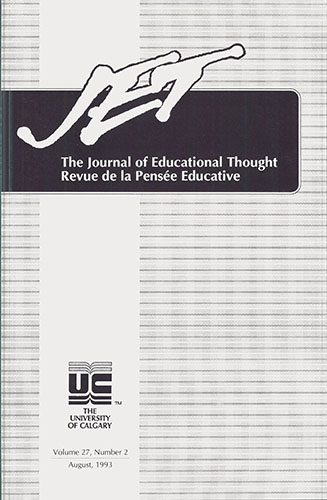L'Education a l'Heure de la Crise: A Ia Recherche de l'Equilibre
DOI:
https://doi.org/10.11575/jet.v27i2.52321Abstract
The author perceives contemporary educational thought as polarized along two major axes: utilitarianism and holism. Utilitarianism is the result of a conglomeration of doctrines influenced by Cartesian dualism, Newtonian mechanism, and social Darwinism; all of these share a fragmentary and reductionist view of reality. In opposition to that view, holism, in both its rational and intuitive forms, tends to see reality as a global and unified whole. The traditionalist position, in search of a renewed foundation where relativism prevails, oscillates between these two major axes. The author suggests the Taoist principles of yin and yang, the complementary poles of reality, as a background for his analysis. He presents a cyclical model of change in which interaction between the yin and yang polarities results in a cultural evolution wherein equilibrium and disorder alternate. The evaluation of recent trends in education is analyzed and epistemological issues are raised. Finally, the author underlines the potential influences of both the utilitarian and holistic axes on the outcome of the current crisis in education.
Downloads
Published
Issue
Section
License
The Journal of Educational Thought retains first publication rights for all articles. The Journal grants reproduction rights for noncommercial educational purposes with the provision that full acknowledgement of the work’s source be noted on each copy. The Journal will redirect to the appropriate authors any inquiries for further commercial publication of individual articles. All authors wishing to publish in JET will be asked to fill in and sign a Consent to Publish and Transfer of Copyright agreement.
Authors must affirm that any submission to JET has not been and will not be published or submitted elsewhere while under considration by JET.

